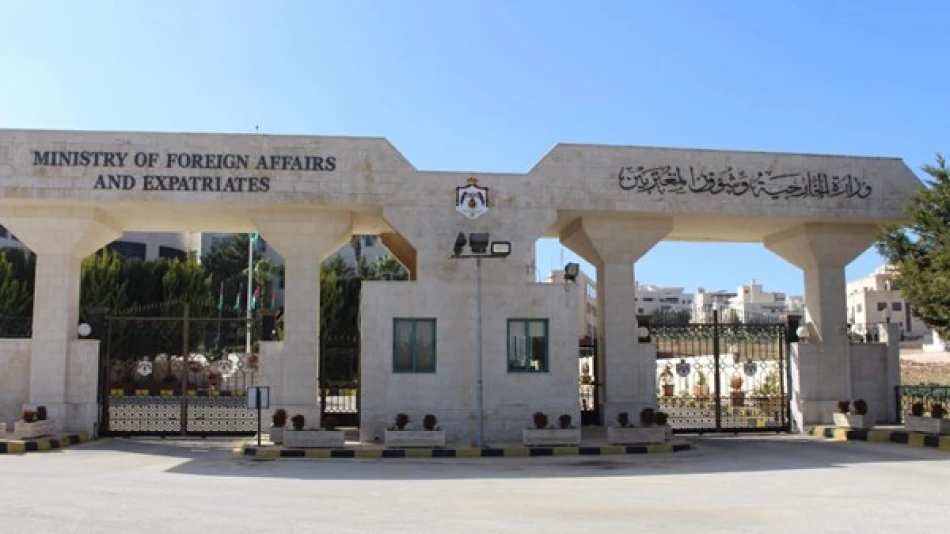
Jordan Hosts Meeting to Discuss Funding Syria's Reconstruction Efforts
Jordan Mediates Critical Syria Reconstruction Talks as Regional Powers Seek Post-Conflict Stability
Jordan will host a pivotal trilateral meeting Tuesday bringing together Syrian and American officials to chart Syria's reconstruction path, signaling a potential shift toward pragmatic engagement with Damascus after years of international isolation. The high-level diplomatic gathering represents the most significant multilateral effort to date in addressing Syria's post-conflict rebuilding challenges while balancing regional security concerns.
High-Stakes Diplomacy in Amman
The meeting will feature Jordan's Foreign Minister Ayman Safadi, his Syrian counterpart Asaad al-Shaibani, and U.S. Special Envoy Tom Barak. According to Jordan's Foreign Ministry, discussions will focus on "supporting Syria's reconstruction process on foundations that ensure its security, stability, and sovereignty while meeting the aspirations of the Syrian people and preserving the rights of all Syrians."
This marks the continuation of dialogue initiated during a July 19 meeting in Amman, suggesting sustained diplomatic momentum rather than a one-off engagement. The sequential nature of these talks indicates serious commitment from all parties to find workable solutions.
Jordan's Strategic Calculus
Regional Stability Imperative
Jordan's mediating role reflects its precarious position as a key U.S. ally sharing a 375-kilometer border with Syria. The kingdom has absorbed over 1.3 million Syrian refugees since 2011, straining its limited resources and creating long-term economic and social pressures. For Amman, Syria's reconstruction isn't just humanitarian—it's existential for regional stability and refugee return.
The Hashemite Kingdom has increasingly positioned itself as a pragmatic bridge between Western powers and regional realities, similar to its historical role in Israeli-Palestinian negotiations. This approach has proven economically beneficial, with Jordan securing substantial international aid packages for refugee hosting and regional stability maintenance.
Market and Economic Implications
Reconstruction Opportunity vs. Sanctions Reality
Syria's reconstruction needs are estimated at over $400 billion, representing massive potential opportunities for regional contractors, materials suppliers, and infrastructure developers. However, U.S. and EU sanctions under the Caesar Act severely limit international business engagement with Syrian government entities.
Jordan's economy could benefit significantly from serving as a conduit for Syrian reconstruction, particularly given its strategic location and existing infrastructure connections. The kingdom's construction and logistics sectors are already positioning for potential opportunities, while Jordanian banks maintain cautious distance pending sanctions clarification.
Comparing Regional Approaches
Jordan's mediation strategy contrasts sharply with other regional approaches. While the UAE has moved toward full normalization with Damascus through trade and diplomatic channels, and Saudi Arabia has reopened its embassy, Jordan maintains a more measured approach that keeps Washington engaged while addressing practical bilateral needs.
This mirrors successful Jordanian diplomacy during the Iraq reconstruction period, where the kingdom served as a crucial logistics hub and diplomatic facilitator while maintaining strong ties with all stakeholders.
The American Dilemma
U.S. participation signals potential policy evolution from pure isolation toward managed engagement. Washington faces growing pressure to address humanitarian concerns while maintaining leverage over Syrian government behavior and Iranian influence.
The Biden administration's involvement suggests recognition that complete disengagement has failed to achieve policy objectives while regional allies increasingly pursue independent approaches. However, congressional sanctions requirements limit American flexibility, creating tension between diplomatic engagement and legal constraints.
Implications for Syria's Future
The trilateral format offers Damascus a pathway toward international rehabilitation without requiring immediate political concessions. For the Syrian government, reconstruction funding represents both economic necessity and political legitimacy, while international engagement could gradually erode its regional isolation.
Success in these talks could establish a model for broader international engagement with Syria, potentially influencing European Union policy and encouraging other regional powers to formalize their Syrian engagement. Failure, however, might push regional actors toward unilateral approaches that bypass American concerns entirely.
The meeting's outcomes will likely determine whether Syria's reconstruction proceeds through coordinated international effort or fragmented bilateral arrangements that could complicate long-term stability objectives.
Most Viewed News

 Layla Al Mansoori
Layla Al Mansoori






